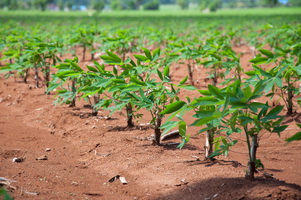|
|
IITA Begins Confined Field Trials of Transgenic Cassava |
 The International Institute of Tropical Agriculture (IITA), in collaboration with ETH Zurich Plant Biotechnology Lab has started the confined field trials of transgenic cassava. The research aims to reduce starch breakdown in storage roots of cassava after pruning the shoots, before the crop is harvested. It is also a fact-gathering process to gain fundamental knowledge about starch metabolism in the storage root and about cassava as a crop. The International Institute of Tropical Agriculture (IITA), in collaboration with ETH Zurich Plant Biotechnology Lab has started the confined field trials of transgenic cassava. The research aims to reduce starch breakdown in storage roots of cassava after pruning the shoots, before the crop is harvested. It is also a fact-gathering process to gain fundamental knowledge about starch metabolism in the storage root and about cassava as a crop.
|
|
|
|
|
Researchers Find Genetic Mechanism that Could Enhance Yield of Cereal Crops |
|
 A research team from the Donald Danforth Plant Science Center led by Andrea Eveland has identified a genetic mechanism that could increase the yields of cereal crops. The team performed the research in Setaria viridis, a grass that is closely related to economically important cereal crops and bioenergy feed stocks such as maize, sorghum, switchgrass, and sugarcane. A research team from the Donald Danforth Plant Science Center led by Andrea Eveland has identified a genetic mechanism that could increase the yields of cereal crops. The team performed the research in Setaria viridis, a grass that is closely related to economically important cereal crops and bioenergy feed stocks such as maize, sorghum, switchgrass, and sugarcane.
In their study, the scientists mapped a genetic locus in the S. viridis genome that controls growth of sterile branches called bristles, which are produced on the grain-bearing inflorescences of some grass species. They discovered that these bristles become spikelets that produce flowers and grain. The conversion is determined and regulated by a class of plant hormones called brassinosteroids (BRs), which modulate a range of physiological processes in plant growth, development and immunity. The study also showed that localized disruption of BR synthesis can lead to the production of two flowers per spikelet rather than the single one that it typically forms. Eveland said that the discovery of the BR-dependent phenotypes represent two potential avenues for enhancing grain production in millets, including subsistence crops in many developing countries that remain largely untapped for genetic improvement. For more details, read the news release by Donald Danforth Plant Science Center.
|
|
|
|
|
Genome Editing of CLAVATA Genes in Canola Regulates Multilocular Silique Development |
 Multilocular silique is a desirable agricultural trait with great potential for developing high-yield varieties of Brassica. However, no induced multilocular mutants have been reported in canola (Brassica napus) due to its allotetraploid nature. Yang Yang from Huazhong Agricultural University in China has found the efficient knockout of canola homologues of CLAVATA3 (CLV3) and its related receptors, CLV1 and CLV2, in the CLV signalling pathway using the CRISPR-Cas9 system. Multilocular silique is a desirable agricultural trait with great potential for developing high-yield varieties of Brassica. However, no induced multilocular mutants have been reported in canola (Brassica napus) due to its allotetraploid nature. Yang Yang from Huazhong Agricultural University in China has found the efficient knockout of canola homologues of CLAVATA3 (CLV3) and its related receptors, CLV1 and CLV2, in the CLV signalling pathway using the CRISPR-Cas9 system.
|
|
|
|
|
|
|

|
A biweekly update on gene editing research, regulations, and impact
produced by ISAAA Inc. |
| |
|
|

|
| A monthly update on gene drive research and development provided by ISAAA in collaboration with the Outreach Network for Gene Drive Research |
| |
|
|
|
|
GM APPROVAL UPDATES |
- The Philippines approved the canola event LBFLFK for food, feed, and processing.
- The Philippines approved the cotton event GFM cry1A for commercial cultivation.
- Brazil approved the wheat event HB4 for commercial cultivation.
- The Philippines approved the soybean event GMB 151 for food, feed, and processing.
- The Philippines approved the eggplant event EE-1 for cultivation
- The USA approved the canola event MON94100 for food and feed.
|
|
|
|
| Biotech Updates is a weekly newsletter of ISAAA, a not-for-profit organization. It is distributed for free to over 22,000 subscribers worldwide to inform them about the key developments in biosciences, especially in biotechnology. Your support will help us in our mission to feed the world with knowledge. You can help by donating as little as $10. |
|
|
|
|